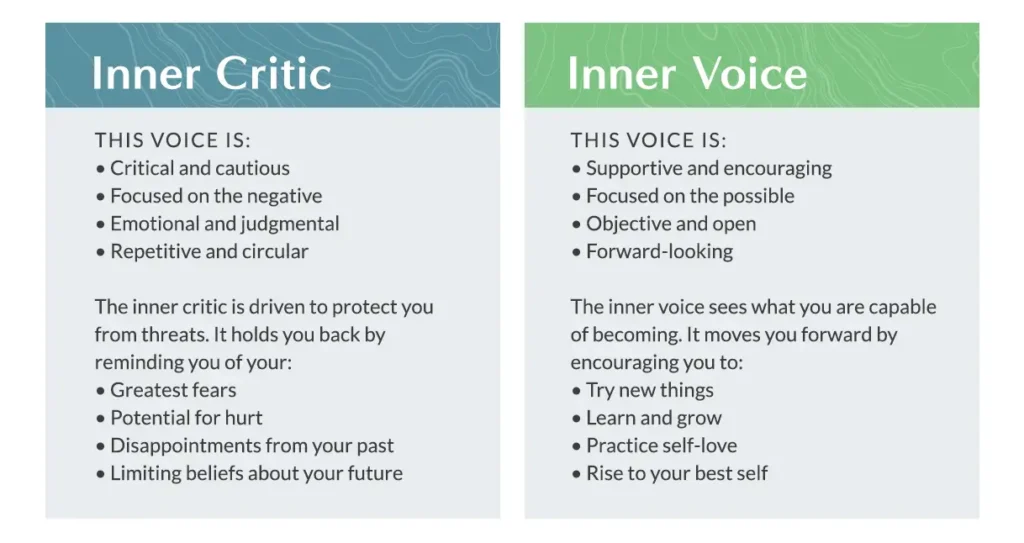Call it your inner monologue or your self-talk. Either way, you’re talking to yourself all the time in your head and the way you do it can make big difference in your growth and mental health. It’s okay to have self-criticism occasionally as it aids our development and teaches us vital things. However, when the voice is unhelpful, it can cause anxiety and undermine our self-esteem. It is necessary to learn to separate from it and restructure our thoughts. Our entire well-being is enhanced when we step back from our critical thinking and replace it with more constructive ideas. It is crucial to undo our default thought patterns and deliberately select more compassionate ones; this process requires patience and practice. Dealing with your inner critic is crucial because if you don’t, it could negatively impact your relationships, your ability to work, and everything else for a long time.
What’s the tone of your inner voice? Harsh? Mean? Critical? Supportive? Does it lift you up or tear you down? The general vibe of our inner voice greatly determines what we go after in life. It can help us thrive or hold us back; big time. Call the inner murmur whatever you want; the voice in your head. The harsh inner critic. The bad roommate within. Having a supportive team mate in your head that encourages you to take risk and pursue the things that light you up in invaluable.

These negative thoughts tell us when to worry and what to worry about, but never do they offer us real solution to our problems. If we were to challenge these negative thoughts, we would soon realize that not only is this destructive thought process amplifying our stress levels but it is actually causing us much of our anxiety in the first place.
For example, many of us feel concern when we have more things we need to do or want to do than we believe we can get done. Very often, however, we are placing too much pressure on ourselves and setting our expectations too high. In effect we are setting ourselves up, and literally scheduling ourselves out, to get stressed. When we set our standards too high, we often set ourselves to later become a target for our critical inner voice. We start to have self-critical thoughts like: what is wrong with you? You never give 100% to anything. Can’t you just get one thing, right? you’re such a failure!

Even when times are tough or the pressure being placed on us is external, we can seek out an inner sense of calm by quieting those inner voices that exacerbate the problem. This is not meant to undermine the fact we all have real concerns about our lives. We all struggle at some point with our careers, our families and our futures. Everyone of us has concerns at one time or another about keeping a job, falling in love or raising our kids. However, what we actually feel about these things is usually never as bad as what our critical inner voice is telling us to feel about these things.
For example, when we lose a job, we may have thoughts like: what are you going to do now? you can’t do anything. How humiliating! We go through a break up with partner, we may hear voices such as: see? No one could ever love you. You’re going to wind up alone.
Even an event as simple as forgetting to mail a letter can get our self-attacks going: you’re so irresponsible. How are you ever going to get anything done?
These thoughts impair us in our actions and lead us to feel demoralized and even stressed out. We can interrupt this cycle by becoming more aware of the thoughts that are propelling our feelings of worry. To fully rid oneself of the critical inner voice, one must not only identify the negative thoughts but stand up to them. Putting our voices in the second person can help us make this initial separation. Try to write down your critical thoughts, first as “I” statements, then as “YOU” statements. If you have thoughts of feeling stupid, write down “you are so stupid.” Next, stand up to this internal enemy by writing down responses to your critical thoughts with the more realistic perspective of a compassionate friend. For example, you could write, “I am not stupid. Anyone can make a mistake. I’ve a lot of areas in which I am intelligent and confident.” The intention here is not to build yourself up, but to gain a more realistic view of yourself.

Finally, think about what the actions are that could encounter your critical inner voices. Avoid actions that will lead you to feel worse. If eating three slices of pizza relieves you after a stressful day only to leave you late stressing over your weight, it’s best not to use that behavior as a coping mechanism. Remember the critical inner voice is tricky and can sound soothing or friendly as it lures you into self-destructive behaviors. The voice can also tell us that we are being victimized. When we have thoughts like, why is everyone walking over you? No one else does anything around here, we put ourselves in a powerless position and blame others for the pressure we’ve put ourselves under.
Here are some tips that you can follow to calm your inner voice;
- Distanced self-talk: Talking to yourself as if you are another person is calming and can help you make better impression, or improve your performance.
- The power of touch: Hug someone close to you as this will relieve your pain and inner voice.
- The power of nature: Walk around the nature, trees or a park. Nature helps you get rid of negative thoughts
- Activities that create “Awe”: A walk in the mountains, or looking at a work of art can also help you have some positivity in mind.
- Writing a daily journal: Writing down about all your day and thoughts can help you figure out what’s going wrong with you.
- Creating exterior order: Tidying up has an impact on your interior order.





Can you be more specific about the content of your article? After reading it, I still have some doubts. Hope you can help me.
Can you be more specific about the content of your article? After reading it, I still have some doubts. Hope you can help me.